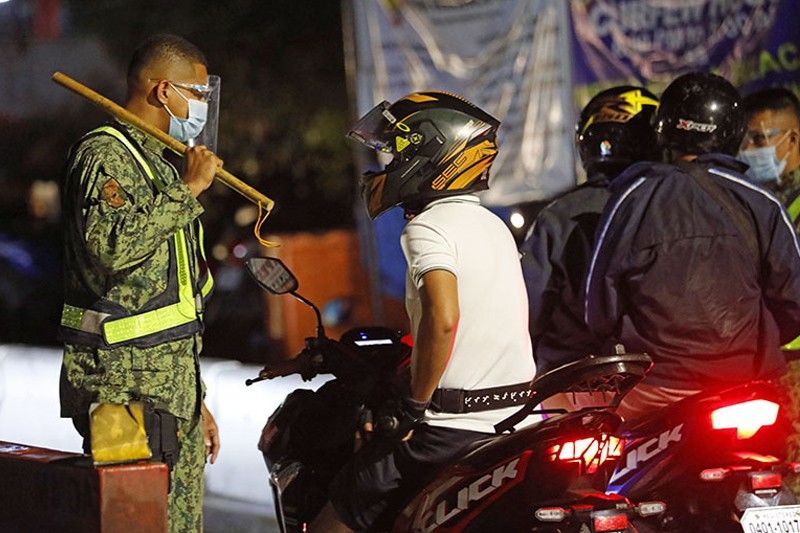People traveling for medical reasons allowed to cross borders

MANILA, Philippines — Persons who need to travel for medical reasons will be allowed to cross borders amid the enhanced community quarantine (ECQ) imposed in different parts of the country, the Philippine National Police (PNP) said yesterday.
PNP chief Gen. Guillermo Eleazar said people with health and family emergencies would be considered authorized persons outside residence (APOR), adding to the list of the PNP’s allowable residents outdoors such as workers and customers of businesses or industries allowed to operate during ECQ.
“Included in other APORs are our citizens who have appointments with doctors and those who need to go home due to the death of immediate family members, or those whose spouses are about to give birth and other reasons that are part of our culture as Filipinos,” Eleazar said in a statement.
“Police will also not block those who have medical check-ups in other cities and those driving them across borders,” he added.
Aside from these, Eleazar said persons who require emergency treatment will be allowed to cross borders if their condition cannot be treated within their locality due to unavailable medical facilities or services.
The PNP has set up checkpoints in different areas surrounding Metro Manila as early as Aug. 1 or days before the implementation of ECQ over the capital region to limit people’s movement amid the threat of the Delta variant.
The Department of the Interior and Local Government (DILG) earlier said authorities have been instructed to honor old Interagency Task Force IDs for authorized persons, company IDs or certificates of employment in allowing passage to the region.
Meanwhile, the DILG spokesman Jonathan Malaya said it was opposing the PNP’s suggestion to remove fixed checkpoints and setting up random control points instead, stressing that such a policy would be hard to implement.
It was earlier reported that the PNP was considering the removal of fixed control points amid the traffic congestion they were causing.
Eleazar said cops should instead be deployed in areas such as vaccination sites and cash aid distribution centers where they are “needed more.”
“If we don’t have checkpoints, how could we enforce the curfew? … Secondly, the general rule during ECQ is to stay at home unless you are an APOR. How can we enforce that if we don’t have checkpoints?” Malaya added.
The PNP has deployed its body-worn cameras – intended for anti-drug operations – in the implementation of the ECQ in Metro Manila, as well as in manning border control points around the region.
“Our personnel on the ground have been dealing with a large number of people on a daily basis since day one of the ECQ on Aug. 6. These body-worn cameras will serve as the constant reminder for them to be courteous at all times and at the same time, their protection against claims and allegations of abuses,” said Eleazar.
ECQ violators
There are existing rules that could be used by law enforcers to hold ECQ violators accountable for not following the imposed safety and health protocols, Justice Secretary Menardo Guevarra said yesterday.
The PNP recently reported that since the ECQ was put in effect last Friday, there have been 20,000 quarantine violators apprehended, fined and warned.
Guevarra said there are related laws, such as those under the DILG-PNP-Department of Justice joint memorandum circular, that could be used to reprimand or impose sanctions against those who defy protocols aimed to stop the spread of COVID-19.
“Apprehensions of violators of health and safety ordinances, quarantine-related rules issued by competent authorities and related laws of national application are covered by the DILG-PNP-DOJ joint memorandum circular (JMC) issued on May 31,” Guevarra said.
In the JMC, local government units (LGUs) are mandated to identify and provide large and open-air holding areas which shall be used for booking and initial investigation purposes.
The police officers should also ensure that any apprehension of persons cited for violation of minimum public health standards is anchored on an existing, valid and applicable local ordinance or law.
“Where the law or ordinance allows the payment of a fine or the rendition of community service to avoid criminal prosecution, the same shall be observed to avoid congestion in detention centers and holding areas and in prosecutor’s offices,” the justice secretary said. – Evelyn Macairan
- Latest
- Trending




























